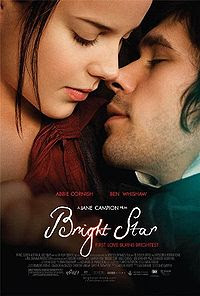 This week I saw the movie Bright Star. It's a romance telling the story of the renowned English poet John Keats and Fanny Brawne, a couple who cared deeply for each other but fate ultimately kept apart. The setting was England about 1820. It features period costumes and, of course, poetry. The movie stars Ben Whishaw as John Keats and Abbie Cornish as Fanny Brawne, with Paul Schneider as Charles Armitage Brown.
This week I saw the movie Bright Star. It's a romance telling the story of the renowned English poet John Keats and Fanny Brawne, a couple who cared deeply for each other but fate ultimately kept apart. The setting was England about 1820. It features period costumes and, of course, poetry. The movie stars Ben Whishaw as John Keats and Abbie Cornish as Fanny Brawne, with Paul Schneider as Charles Armitage Brown.Bright Star was released in 2009, and it played several art film theaters around town. I wanted to see it then, as I admire Keats' poetry, but didn't. I borrowed the DVD from the public library, after being on a lengthy waitlist, and I'm glad I did. The love story was touching, emotional, and a bit unconventional. The ending was quite sad, but I knew that going in. I would recommend Bright Star, it's a well-made, interesting to see, movie.
